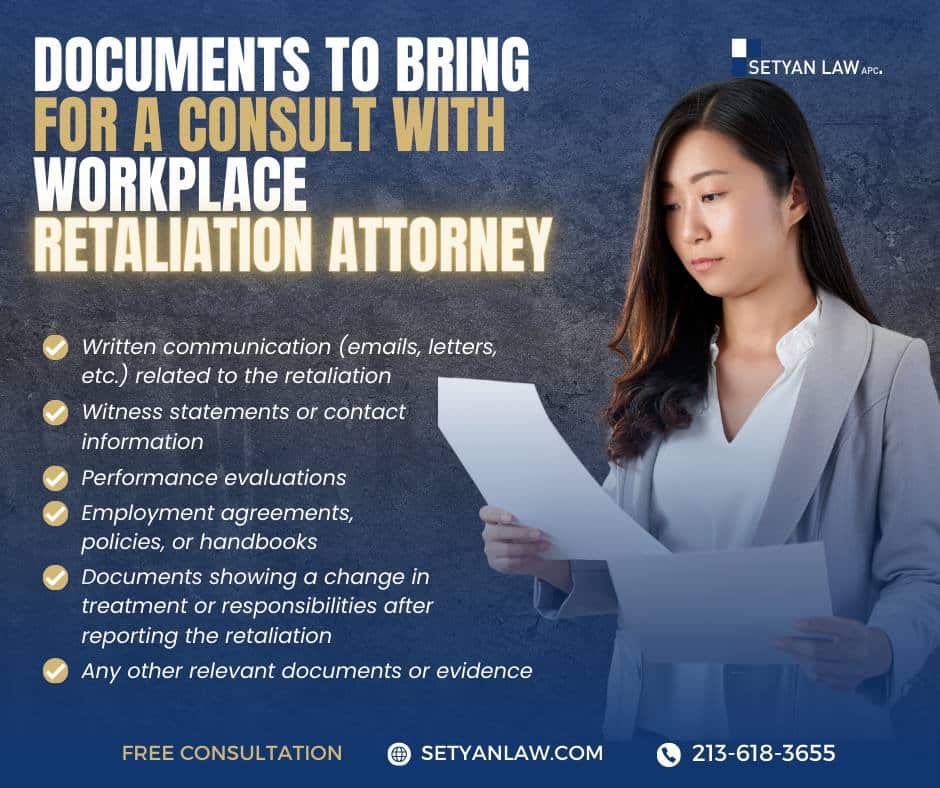Updated June 26, 2025
How to File a Fair Housing & Employment Retaliation Claim with CRD
Have you faced retaliation after reporting discrimination or standing up for your rights? Filing a fair housing and employment complaint might be your most powerful recourse.
Retaliation occurs when employers or housing providers punish individuals for engaging in legally protected activities. Whether it’s firing you after reporting sexual harassment, reducing your hours following a disability accommodation request, or evicting you for complaining about discriminatory housing practices, these actions are illegal under California law.
Fortunately, the California Civil Rights Department (CRD) offers a structured process to address these violations. This agency enforces civil rights laws across the state and provides important protections for individuals facing retaliatory treatment. However, navigating the complaint process can be challenging without proper guidance.
This step-by-step guide walks you through the entire process of filing a retaliation claim with the CRD. We’ll cover how to determine if you have a valid claim, when to seek legal counsel, what evidence strengthens your case, how to properly file your complaint, and what to expect during the investigation phase.
Understanding these procedures is essential, as missing deadlines or failing to provide adequate documentation can significantly impact your chances of obtaining justice.
Step 1: Understand If You Have a Valid Retaliation Claim
Before taking action against workplace or housing discrimination, you must first determine if your situation meets the legal criteria for retaliation. California law offers robust protections, but understanding what constitutes a valid claim is essential for success.
What counts as retaliation under California law
Retaliation occurs when an employer, housing provider, or other covered entity takes an adverse action against you because you engaged in a legally protected activity. Essentially, this means you were punished for exercising your rights.
Under California Labor Code 1102.5 and the Fair Employment and Housing Act (FEHA), retaliation claims require establishing three key elements:
- You engaged in a protected activity
- You suffered an adverse employment action or discriminatory treatment
- There was a causal connection between your protected activity and the adverse action
California law significantly strengthens your position through a rebuttable presumption of retaliation. Specifically, if an employer takes adverse action against you within 90 days of your protected activity, the law presumes it was retaliatory 1. This shifts the burden to the employer to prove they had legitimate, non-retaliatory reasons for their actions.
Protected activities under FEHA and Fair Housing laws
Protected activities are specific actions that trigger legal protection against retaliation. These vary between employment and housing contexts:
In employment settings, protected activities include:
- Filing or threatening to file a discrimination complaint
- Opposing workplace harassment or discrimination
- Testifying in an investigation about discrimination
- Requesting reasonable accommodations for disabilities or religious beliefs
- Reporting violations of state or federal laws to supervisors or government agencies
- Refusing to participate in activities that would violate laws
For housing, protected activities include:
- Reporting discriminatory housing practices
- Assisting others in exercising fair housing rights
- Opposing discriminatory practices by housing providers
- Requesting reasonable accommodations for disabilities
Furthermore, California’s laws protect individuals from retaliation based on numerous characteristics including race, color, religion, sex, gender, disability, sexual orientation, marital status, and source of income 2.
Common examples of employer retaliation
Retaliation can take many forms beyond outright termination. Common examples include:
- Demotion or reduction in responsibilities
- Negative performance reviews that weren’t justified by actual performance
- Transfer to less desirable positions or locations
- Exclusion from meetings or important projects
- Reduction in hours or pay
- Increased scrutiny of work or time records
- Verbal or physical abuse
- Creating a hostile work environment
- Threats related to immigration status
In housing contexts, retaliation might involve:
- Eviction or threats of eviction
- Refusing to make necessary repairs
- Increasing rent selectively
- Changing terms of tenancy
- Harassment or intimidation
Notably, an adverse action may still constitute illegal retaliation even if there are legitimate reasons behind it. For instance, if a tenant is evicted for late rent but the landlord’s decision was partially motivated by the tenant’s fair housing complaint, this could still qualify as unlawful retaliation 3.
Understanding these fundamentals will help you determine if your situation merits filing a formal complaint with the California Civil Rights Department or pursuing other legal remedies.
Step 2: Hire a Lawyer Early
Securing legal representation early in the retaliation claims process can dramatically impact your chances of success. While it’s possible to navigate the system independently, working with a knowledgeable attorney offers significant advantages.
Why legal advice is critical
The legal complexity of retaliation claims makes professional guidance invaluable. An experienced attorney can:
- Evaluate whether your situation meets the legal standards for a valid claim
- Identify which laws apply to your specific circumstances
- Properly frame your complaint to include all relevant legal theories
- Recognize subtle forms of retaliation that may not be obvious
- Anticipate and counter employer defenses
Additionally, cases often involve nuanced interpretations of the law. According to the California Civil Rights Department, employers remain free to discipline or terminate employees for legitimate, non-discriminatory, non-retaliatory reasons, despite any prior protected activity. Therefore, distinguishing between legitimate adverse actions and illegal retaliation requires legal expertise.
Moreover, an attorney serves as your advocate throughout what can be an emotionally draining process. They provide objective counsel while you focus on your wellbeing and future.
How to find a labor or housing rights attorney
Locating the right legal representation requires a strategic approach:
- Seek specialized expertise: Look for attorneys who focus specifically on employment or housing discrimination law in California, not general practitioners.
- Research credentials: Verify their experience with retaliation claims and review their track record with similar cases.
- Consult local bar associations: The California State Bar and local county bar associations offer attorney referral services.
- Contact legal aid organizations: If cost is a concern, explore legal aid societies that provide reduced-cost or free representation for qualifying individuals.
- Schedule consultations: Most employment attorneys offer free initial consultations to assess your case. Use this opportunity to determine if they understand retaliation law and if their communication style works for you.
When interviewing potential attorneys, ask about their familiarity with the CRD complaint process, their approach to gathering evidence, and their success rate with retaliation claims.
Time limits for filing a CRD complaint
Understanding the strict deadlines for filing is crucial, as missing them typically means losing your right to pursue a claim altogether:
- Employment retaliation: You must submit an intake form to the CRD within three years of the date you were last harmed.
- Housing discrimination/retaliation: You must file within one year of the date you were last harmed.
- After receiving a Right-to-Sue notice: Once the CRD issues this document, you have one year to file a lawsuit in court.
For employment cases specifically, you must obtain an immediate Right-to-Sue notice from the CRD before filing your own lawsuit in court. Despite these requirements, you don’t necessarily have to complete the full CRD investigation process.
Given these timeframes, consulting with an attorney early provides the necessary time to thoroughly prepare your case, gather compelling evidence, and meet all procedural requirements. Waiting until deadlines approach can result in rushed filings that overlook critical details or fail to present your strongest possible claim.
An attorney will also help determine whether your case might warrant direct legal action rather than proceeding through the administrative process, saving you valuable time and potentially leading to a more favorable resolution.
Step 3: Collect Strong Evidence
Building a solid retaliation case requires substantial evidence to connect your protected activity to the adverse action you experienced. The California Civil Rights Department (CRD) needs convincing documentation to proceed with your complaint effectively. Let’s examine the essential types of evidence you should collect.
Proof of protected class or activity
Start by documenting exactly how and when you engaged in protected activity. This provides the foundation for your retaliation claim:
- Save copies of any formal complaints you filed (internally or externally)
- Preserve emails or letters where you reported discrimination
- Document accommodation requests for disabilities or religious practices
- Keep records of your participation in any investigation
- Maintain copies of communications where you opposed discriminatory practices
A complaint is protected opposition as long as the circumstances show you were conveying resistance to a perceived potential civil rights violation, even if you didn’t use legal terminology like “harassment” or “discrimination.” The protection applies if you had a reasonable good faith belief that the conduct you opposed was unlawful.
Documentation of adverse actions
Next, gather evidence showing the negative consequences you experienced:
- Performance evaluations (especially those showing sudden changes)
- Disciplinary notices issued shortly after your protected activity
- Communications about demotions, transfers, or terminations
- Pay stubs showing reduced hours or compensation
- Records of promotion denials or exclusion from opportunities
- Documentation of harassment or hostile treatment
In employment cases, “materially adverse” actions include more than just termination or demotion. Courts have found that transferring a worker to a harder job within the same pay grade, changing work schedules for parents with childcare responsibilities, or excluding an employee from training lunches can all qualify as retaliation.
Witness statements and internal emails
Witness testimony can substantially strengthen your case, especially since these individuals typically have nothing to gain by supporting you. Collect:
- Written statements from coworkers who observed the discrimination or adverse actions
- Statements from former workers familiar with similar patterns of retaliation
- Internal communications, including emails and text messages
- Social media posts or messages relevant to your situation
- Records of meetings where discriminatory statements were made
Importantly, an investigator may gather evidence through interviews with parties and witnesses, document review, and even property inspections.
Timeline of events
Finally, create a comprehensive chronology that clearly demonstrates the connection between your protected activity and the subsequent adverse action:
- List all relevant dates, beginning with your first interaction with the person or entity involved
- Note when you engaged in protected activity
- Record when adverse actions occurred
- Document any relevant communications or meetings
- Note any patterns of treatment that changed after your protected activity
The timing between your protected activity and the adverse action is particularly significant. Under California law, if an employer takes adverse action within 90 days of your protected activity, there’s a rebuttable presumption that it was retaliatory, shifting the burden to the employer to prove otherwise.
Properly organized evidence not only strengthens your claim but also helps investigators quickly understand your case.
Step 4: File Your Complaint with CRD
Once you’ve gathered your evidence and consulted with an attorney, it’s time to formally file your complaint with the California Civil Rights Department (CRD). This critical step initiates the official investigation process.
How to file online or by mail
The CRD offers several filing methods, with online submission being the fastest and most convenient option:
- Online: Create an account through the California Civil Rights System (CCRS) portal. This method offers numerous benefits including self-service appointment scheduling, the ability to upload documents, and the option to pause and resume your filing within 30 days.
- By mail: Download and complete the appropriate intake form in your preferred language, then mail it to CRD headquarters: 651 Bannon Street, Suite 200, Sacramento, CA 95811.
- By email: Send your completed intake form to contact.center@calcivilrights.ca.gov.
- By phone: Call 800-884-1684 (voice) or 800-700-2320 (TTY) for assistance.
Choosing between CRD and EEOC
Although CRD and EEOC share jurisdiction over many discrimination cases, there are important differences:
The CRD enforces California state laws, which typically offer broader protections than federal laws. For instance, FEHA does not cap financial compensation for emotional distress, whereas Title VII does. Consequently, filing under California’s FEHA is often more advantageous when both state and federal laws apply.
When you file with either agency, your complaint is generally cross-filed with the other agency through a work-sharing agreement, yet only one agency typically investigates.
What to include in your complaint
Your complaint should contain:
- Your complete contact information
- The respondent’s name and contact details (employer/housing provider)
- Specific facts about the discriminatory incidents, including dates
- Names and contact information of witnesses
- Description of the protected activity you engaged in
- Documentation of adverse actions taken against you
- Timeline connecting your protected activity to the retaliation
Requesting a Right-to-Sue letter
You can request an immediate Right-to-Sue notice when filing your complaint if you prefer to proceed directly to court rather than waiting for a CRD investigation. This option is particularly useful when working with an attorney ready to litigate.
After receiving this notice, you have one year to file a lawsuit. Remember that once you receive a Right-to-Sue notice, CRD will not investigate your complaint even if you later decide against filing a lawsuit.
Step 5: Cooperate with the Investigation and Seek Resolution
After submitting your fair housing or employment retaliation complaint to the CRD, the investigation phase begins. This critical stage requires your active participation to ensure the best possible outcome for your case.
What happens after you file
Once your intake form is received, the CRD evaluates whether your allegations fall under their jurisdiction. If accepted, a CRD representative prepares a formal complaint document for your signature. This document will be served on the person or entity you’ve named (the respondent), who then has 30 days to respond.
The investigation process typically includes gathering evidence from both sides, interviewing parties and witnesses, and reviewing relevant records. CRD has authority to conduct interviews under oath, issue subpoenas, and seek temporary restraining orders during its investigation.
The intake interview and complaint form
Shortly after filing, you’ll be contacted by an investigator for an intake interview, usually conducted by phone. During this conversation, the investigator will ask detailed questions about the alleged retaliation. Be prepared to explain exactly what happened, when it occurred, and how it relates to your protected activity.
If the investigator determines you have a valid claim, they’ll provide a complaint form describing the events. Review this document carefully for accuracy before signing and returning it to CRD. This signed form officially initiates the investigation.
Employer response and mediation options
Meanwhile, your employer or housing provider will receive the complaint and have the opportunity to respond. During the investigation, CRD may offer free mediation services through their Dispute Resolution Division. Each year, this division resolves hundreds of complaints by bringing parties together in a confidential setting.
If you choose mediation, the investigation pauses while negotiations occur. This process has proven highly effective – in one case, a settlement provided $375,000 to a complainant who was denied reasonable accommodations, along with required training for managers on civil rights laws.
When to consider filing a lawsuit
Initially, assess whether CRD’s administrative process meets your needs. In employment cases, you must obtain a Right-to-Sue notice before filing in court, yet you don’t have to complete the full CRD investigation.
Consider filing a lawsuit if:
- You have strong evidence and legal representation
- The harm you suffered is substantial
- Mediation hasn’t produced a satisfactory resolution
- CRD completes its investigation without finding reasonable cause
Should CRD find reasonable cause that retaliation occurred, they’ll notify both parties and may file a lawsuit on your behalf. Undoubtedly, CRD representation can be advantageous, as their attorneys represent the Department at no cost to you, and you’ll receive 100% of any remedies recovered (except attorney fees and costs).
Conclusion
Standing up against retaliation demands courage, persistence, and knowledge of the legal system. Throughout this guide, we’ve walked through the essential steps needed to successfully file a fair housing or employment retaliation claim with the California Civil Rights Department.
Remember, California offers robust protections against retaliatory actions. Accordingly, understanding whether your situation qualifies as illegal retaliation forms the foundation of your case. The law presumes retaliation when adverse actions occur within 90 days of your protected activity, giving you a significant advantage.
Legal representation proves invaluable during this complex process. Though not mandatory, an attorney significantly strengthens your position by identifying all applicable legal theories and helping navigate procedural requirements. Most importantly, securing counsel early ensures you meet critical filing deadlines—three years for employment claims and one year for housing claims.
Evidence makes or breaks your case. Consequently, maintaining detailed documentation of your protected activity, the adverse actions you experienced, witness statements, and a clear timeline connecting these events remains essential. This documentation provides CRD investigators with compelling proof of the retaliatory treatment you endured.
Filing options offer flexibility based on your circumstances. Whether submitted online through the CCRS portal, by mail, email, or phone, your complaint initiates official proceedings against the respondent. Additionally, understanding the difference between CRD and EEOC jurisdiction helps determine your optimal filing strategy.
The investigation phase requires your active participation. CRD’s process includes evidence gathering, interviews, and potentially mediation services that might resolve your complaint without lengthy proceedings. Alternatively, you may request an immediate Right-to-Sue notice if direct legal action better serves your situation.
Retaliation claims challenge unlawful behavior and help establish workplace and housing environments free from discrimination. By following these steps and asserting your rights, you contribute to a more just society while seeking personal remedy. Fighting back against retaliation not only addresses your individual circumstances but also reinforces the protections California law provides for everyone.
Call Setyan Law at (213)-618-3655 to schedule a free consultation.






